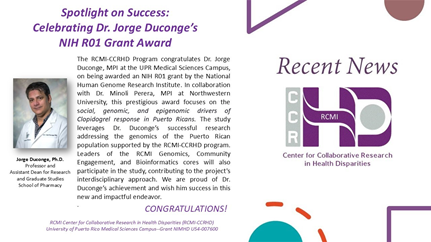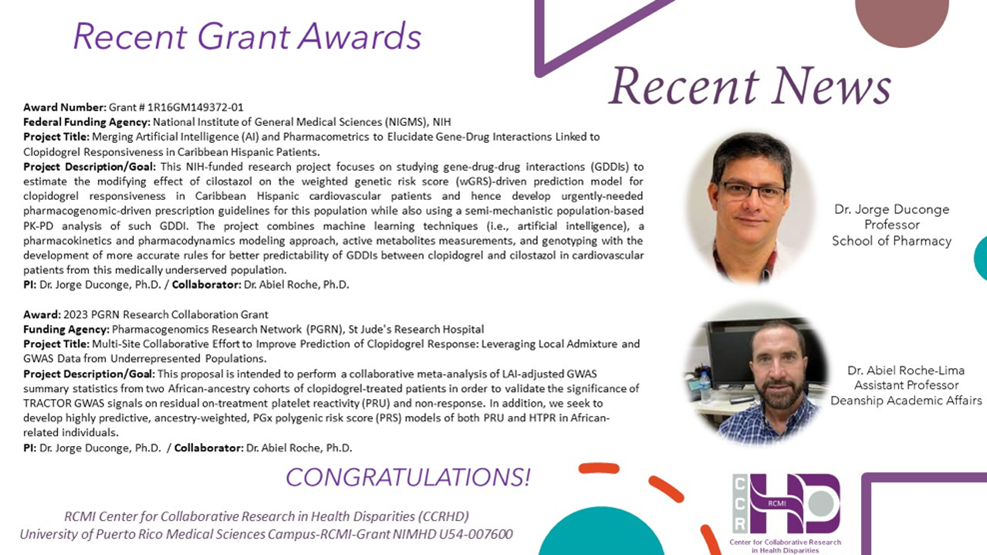Adopting a Precision Medicine Paradigm in Puerto Rico: leveraging ancestral diversity to identify predictors of clopidogrel response in Caribbean Hispanics
PI: Dr. Jorge Duconge
Despite the substantial work in cardiovascular pharmacogenomics published over the past decade, a fundamental gap remains in understanding whether the genomic variation of Caribbean Hispanics accounts for the observed high inter-individual variability of clinical outcomes to preventive dual antiplatelet therapy (DAPT) with clopidogrel. Caribbean Hispanics are disproportionately affected by cardio-metabolic disorders, but with a limited expectation of benefits from existing genomic-guided applications. To address this concern, this study is focused on clopidogrel pharmacogenomics in Hispanics by developing urgently-needed genomic-driven prescription guidelines for this population. To this purpose, we have proposed to perform the first ever GWAS of a pharmacogenetically actionable prescription drug in Caribbean Hispanics. Our study will also take a novel approach to definitively assess the admixture component and is also highly practical for the development of a clinical decision support (CDS) tool. Besides, we will implement a treatment algorithm to guide DAPT in Caribbean Hispanics. Overall, we seek to adopt a precision medicine (PM) paradigm in Caribbean Hispanics by leveraging their ancestral variation to identify predictors of clopidogrel responsiveness. If this PM-guided approach is successful, it may herald a fundamentally new way of approaching DAPT in cardiovascular patients with Caribbean Hispanic heritage, reducing a large number of avoidable major adverse cardiovascular events (MACE) and comorbidities in this minority and medically disadvantaged population, often marginally represented in clinical studies. The study will be conducted over 5 years in 1,000 cardiovascular patients, treated with clopidogrel for secondary prevention of thromboembolic events, who will be genotyped using a MEGA chip panel (Illumina® Multi-Ethnic Hispanic AMR/AFR). It is expected that this study advances the adoption of a PM paradigm for the benefit of Hispanic patients.
A Genomic Approach to Warfarin Dose Prescription in Admixed Caribbean Hispanics
PI: Dr. Jorge Duconge
Warfarin is a prescribed “blood thinner” medication used by physicians to make the blood less thick in people with high risk of forming blood clots. In spite of the use of various methods to monitor this medication, life threatening bleeding or strokes are common undesired effects. Several factors significantly influence how much warfarin the patient needs to attain the desired response. Now, we know that by using the information encoded by patient’s genes we can be able to help individualize patients’ treatment and reduce risks of adverse events. In work we did before getting this grant, we found that existing genetic algorithms to predict optimal warfarin dosing do not perform as well in populations other than Caucasians, in part because some ethno-specific genetic variants are overlooked.
In this project, we sought to derive and validate a pharmacogenetic-guided algorithm for personalizing warfarin prescription in Caribbean Hispanics from Puerto Rico, taking into account ethnic-specific alleles and admixture as critical predictors. To this purpose, we analyzed genetics and clinical data from hundreds of warfarin patients.
These were some of our main findings:
- Our study confirmed the extensive inter-patient warfarin dose variability required to maintain anticoagulation within range for prevention of bleeding or strokes in Caribbean Hispanics.
- We developed a new method (i.e., algorithm) to predict optimal warfarin dosing in cardiovascular patients of Caribbean Hispanic origin that is based on individual genetics, ancestry and clinical data.
- This admixture-adjusted, genetic-guided warfarin dosing algorithm explained more than two-thirds of observed variance in stable warfarin dose in Caribbean Hispanics.
- This model outperformed prior genetic algorithms and clinical methods in predicting effective dose in this minority population.
- Our study also validated this genetic method in a real-world group of patients and demonstrated it is an adequate procedure for optimal dose calculations.
- We found unknown genetic variants in our study population that showed stronger association with warfarin sensitivity (<3mg/day) than common variants.
- We identified a novel haplotype, which has been recently accepted as the new CYP2C9*61 allele by the Pharmacogene Variation (PharmVar) Consortium
- The NQO1*2 variant was found to be exclusively associated with higher warfarin dose in Hispanics only.
- A significant association between multiple adverse events and carrier status was observed.
- We demonstrated the value of admixture as a predictor of warfarin response in Caribbean Hispanics.
- We developed a web-based resource (WarfGen) for clinical decision support (CDS) that enables us to provide clinicians with genotyping results and guidance on treating patients with warfarin in real-time.
Overall, the results from this study have proven the pharmacogenetic algorithm to be a valid method to estimate ideal doses in Caribbean Hispanics. This approach is expected to help physicians in Puerto Rico to achieve the desired medical outcomes sooner and stabilize Caribbean Hispanic patients on target for longer with lesser risks of adverse events (serious bleeding, strokes, etc.). Accordingly, our findings are expected to help bringing healthcare fairness to the population of US Hispanics we serve.



Figures taken from Frontiers in Pharmacology 2017; 8:347. doi: 10.3389/fphar.2017.00347 PMCID: PMC5461284 and Pharmacogenomics 2019; 20(1): 3-8. doi: 10.2217/pgs-2018-0143 PMID: 30518301
Awards

Congratulations to Dr. Jorge Duconge on His NIH R01 Grant Award!
We are proud to announce that Dr. Jorge Duconge, Professor and Assistant Dean for Research at the UPR Medical Sciences Campus School of Pharmacy, has been awarded an NIH R01 grant by the National Human Genome Research Institute. In collaboration with Dr. Minoli Perera of Northwestern University, this project will investigate the social, genomic, and epigenomic drivers of clopidogrel response in Puerto Ricans. The study builds on Dr. Duconge’s pioneering research in Puerto Rican genomics, supported by the RCMI-CCRHD program, and integrates efforts from the Genomics, Community Engagement, and Bioinformatics cores. This interdisciplinary project aims to advance precision medicine for underserved populations

In partnership with St. Jude’s Research Hospital, Dr. Duconge and Dr. Abiel Roche-Lima are developing a collaborative meta-analysis of local ancestry-adjusted GWAS to better predict clopidogrel response in admixed populations, with the goal of refining precision medicine tools for diverse communities.




